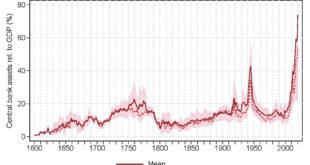Niall Ferguson, Martin Kornejew, Paul Schmelzing and Moritz Schularick in CEPR dp 17858: From the introduction: … time and again, central banks deployed their power to create liquidity in a bid to insulate economies from disasters. … first began to be linked to geopolitical tail events during the 17th and 18th centuries – occurring with increasing regularity during wars and revolutions –, … the context of central bank liquidity support gradually but consistently shifted...
Read More »A bank is a bank is a bank – Part II
Part II of II by Claudio Grass A real systemic crisis If there was one thing more telling than the bank failures themselves, it was the governments’ reaction to them. The sheer panic that shook US, Swiss and Eurozone officials was almost pitiable to behold. The way they all rushed to make statements denying that this would be a repeat of 2008 was alarming instead of reassuring. And their apparent, urgent desperation to be believed was perhaps reason enough why they shouldn’t...
Read More »Could the Fed have Rescued Lehman Brothers?
In a paper, Larry Ball argues that inadequate collateral and lack of legal authority were not the reasons that the Fed let Lehman fail. … … the primary decision maker was Treasury Secretary Henry Paulson–even though he had no legal authority over the Fed’s lending decisions. … evidence supports the common theory that Paulson was influenced by the strong political opposition to financial rescues. … Another factor is that both Paulson and Fed officials, although worried about the effects of...
Read More »The Chinese Yuan Countdown Is On
Submitted by SaxoBank's Dembik Christopher via TradingFloor.com, Currency stability is a prerequisite for China's economic transition Defending the yuan is prohibitively expensive – China cannot beat the market Progressive devaluation managed by PBoC is the most probable scenario for 2016 Remember that the country is on the capitalism learning curve Exchange rates will inevitably be a key discussion point at Shanghai G20 China has moved from being a net importer to a net exporter of...
Read More »The Chinese Yuan Countdown Is On
Submitted by SaxoBank's Dembik Christopher via TradingFloor.com, Currency stability is a prerequisite for China's economic transition Defending the yuan is prohibitively expensive – China cannot beat the market Progressive devaluation managed by PBoC is the most probable scenario for 2016 Remember that the country is on the capitalism learning curve Exchange rates will inevitably be a key discussion point at Shanghai G20 China has moved from being a net importer to a net exporter of...
Read More » Swiss Economicblogs.org
Swiss Economicblogs.org


